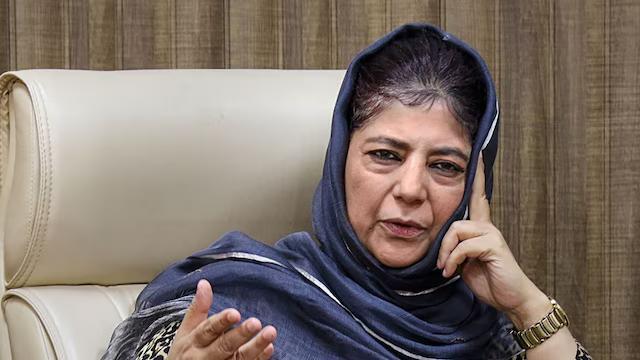
Mufti Alleges Foul Play After OGW Jumps in J&K River, Drowns; BJP Slams Her
In a shocking incident, an overground worker (OGW) in Jammu and Kashmir’s Kulgam district reportedly jumped into a river and drowned, sparking allegations of foul play from former Chief Minister Mehbooba Mufti. The incident has sent shockwaves across the region, with leaders from both sides trading barbs over the matter.
According to reports, the OGW, who was not identified, was picked up by the Army two days ago and was later released. However, instead of returning to his family, he jumped into the river in Kulgam and drowned. The incident has raised questions about the circumstances surrounding his death, with many speculating that he may have been pushed to take his own life or was forced to do so by some agency.
Reacting to the incident, Mehbooba Mufti, the former Chief Minister of Jammu and Kashmir, alleged foul play and claimed that locals had told her that the OGW was picked up by the Army two days ago. “Foul play is suspected,” she tweeted. “The family and locals are crying foul. We need to get to the bottom of this tragedy.”
However, her remarks were promptly slammed by BJP leader Sanju Verma, who accused Mufti of playing politics with the incident. “Mehbooba, after the Pahalgam terror attack, said, ‘Why blame Pakistan?’ Now, she’s trying to blame the Army for the OGW’s death,” Verma tweeted. “This is a classic case of ‘Mehbooba’s selective memory’.”
Verma’s remarks were a clear reference to Mufti’s previous statement on the Pahalgam terror attack, where she had questioned the need to blame Pakistan for the incident. Her comments had sparked controversy at the time, with many accusing her of downplaying the role of Pakistan-backed militants in the attack.
The incident has once again highlighted the complexities of the situation in Jammu and Kashmir, where both the government and separatist groups are engaged in a cat-and-mouse game. The region has been in the grip of turmoil for decades, with militants from Pakistan-backed groups fighting against the Indian government.
The OGW’s death has sparked an outpouring of grief among locals, who have demanded a probe into the circumstances surrounding his death. While the Army has denied any involvement in the incident, the local police are investigating the matter and have ordered an autopsy to determine the cause of death.
The incident has also raised questions about the treatment of OGWs in Jammu and Kashmir. OGWs are individuals who work with militant groups but do not actively participate in military operations. While they are often seen as collaborators by the government, many argue that they are forced to work with the militants due to fear or coercion.
The controversy surrounding the OGW’s death has once again highlighted the need for a peaceful resolution to the crisis in Jammu and Kashmir. The region has suffered greatly due to the conflict, with thousands of people losing their lives and many more displaced.
As the investigation into the OGW’s death continues, it remains to be seen what exactly happened and who is responsible. However, one thing is clear: the incident has sparked a heated debate about the situation in Jammu and Kashmir and the need for a peaceful resolution to the crisis.






